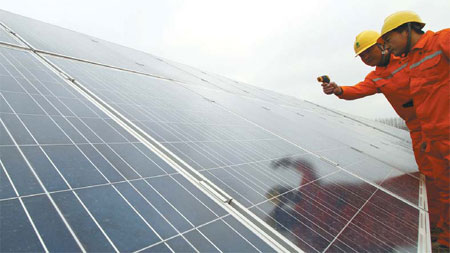Brighter days for solar power
|
State Grid Corp workers conduct daily routine checks on a photovoltaic solar power station in Dezhou, Shandong province. During the first nine months, 2.71 million kilowatts of PV solar power projects were integrated into the national grid within the State Grid's business areas, 4.2 times more than last year. Liang Baohai / for China Daily |
State Grid will provide free connection to lift sector out of doldrums
China will allow distributed photovoltaic solar power producers to be connected to the national grid free of charge in a bid to support the renewable-energy industry.
State Grid Corp, China's largest State-owned power utility company, announced on Friday that starting Nov 1, it will provide a free connection service for distributed PV solar electricity producers that are close to customers. State Grid will be responsible for the cost of the connection design and the national grid's modifications.
The cost for one network access point of the connection is 420,000 yuan ($67,100), and 10 points will be needed for a PV solar project of 1 mW, according to Wang Sicheng, a researcher at the Energy Research Institute under the National Development and Reform Commission.
Chinese PV solar panel producers have been suffering because of anti-dumping investigations by the United States and the European Commission since October 2011.
The US announced punitive tariffs earlier this month, and many small and medium-sized solar cell manufacturers went bankrupt as a result of declining orders from the shrinking foreign market.
Since then, several government departments have been working together on measures and policies to help the industry. A key solution is to expand domestic demand, reducing dependency on overseas markets.
The two major obstacles to China's PV solar power development are high building costs and power transmission management, said Shi Lishan, deputy director of the National Energy Administration's new energy and renewable energy department.
"The government provides favorable policies such as subsidies to PV solar power producers. Otherwise, the high costs need many years to get a return," he said. "Meanwhile, we also lack related regulations and laws on a distributed solar power transmission network.
He said the ultimate goal of China's power transmission is to provide an electricity sales service for users that will be as simple as buying an electric appliance in a store.
State Grid's move will help improve the scale of solar power generation in China, said Martin Daniel, senior Asia power analyst at Platts, a global energy information provider. He said distributed PV solar power is a good way to solve the problem of long distances between major power plants and electricity consumers in rural areas.
During the first nine months, 2.71 million kW of PV solar power projects were integrated into the national grid within the State Grid's business areas, 4.2 times more than last year, according to Shu Yinbiao, executive vice-president of the company.
Those solar projects have generated a total of 2.52 billion kilowatt-hours during the first nine months, a 540 percent year-on-year increase.
At present, PV solar projects with a total generation capacity of 1.26 million kW that have been approved for connection are under construction nationwide, Shu said.
Ding Jie, senior engineer at the China Electricity Power Research Institute, said the technology of distributed solar power generation has developed well in China. However, due to the new energy source's instability, it will affect the national grid. "It will take a very long time before the technology is totally mature," he said.
dujuan@chinadaily.com.cn
(China Daily 10/27/2012 page9)









